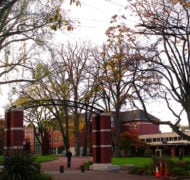Seminaries Teaching Theology of Work
Academic Paper / Produced by Individual TOW Project member
The aim of this paper is to:
- Look at different models seminaries have adopted to include marketplace theology in their curriculum.
- Identify essential elements that a core curriculum might include.
- Identify how these elements are delivered at Laidlaw College.
- Identify some key questions we are still wrestling with.
Models We Can Learn From.
There are currently a variety of different models operating internationally. I have identified nine different approaches. A combination of more than one approach is often adopted.
- Inclusion of one or two Marketplace courses in undergraduate degree programmes
Eg. Carey College (Auckland) and Laidlaw College (Christchurch). American Christian Colleges may include some elements in their liberal arts degrees eg. Seattle Pacific University, Regent University, Gordon College Center for Entrepreneurship and The King’s College New York. - Inclusion of Marketplace courses as part of specialist postgrad Masters and DMin seminary programmes
(Theology is usually done as a postgrad Masters course and not a primary degree in the USA). Eg MCS at Regent College (Vancouver) and MDiv and DMin at Gordon Conwell (Boston) and Bakke Gaduate University (Seattle, but mostly offered online now). Also Laidlaw-Carey Graduate School (one Masters course). Concordia College also has a workplace course in their MDiv programme and they are starting a Marketplace Center. The Christian Graduate School of Theology in Hong Kong has recently appointed a new faculty member (Dr Jean Lee) to develop Marketplace courses. I also note that Asia Pacific Nazarene Theological Seminary in Manila in the Philippines also lists a Theology of Work course (T82) under its regular course offerings, although I have no more information about this course. I have also helped to resource a number of students from Asian theological schools doing Masters and PhD theses on TOW, although I have not included these schools in my study. - Inclusion of a compulsory Marketplace module as part of seminary training
This may or may not include assignments Eg. Intensive modules at Presbyterian School of Ministry (Dunedin - NZ) which includes assignments and also Ridley College (Cambridge-Richard Higginson)) which does not include assignments. Also Luther Seminary (Minneapolis) where examining calling is a compulsory component of their training funded by the Lilly Foundation (and several other schools are also involved in this initiative). The Kern Family Foundation is also funding the development of such programmes for seminary students with several US seminaries at the moment. Eg Bethel Seminary and Azusa Pacific University, etc. - Inclusion of Christian Ethics courses in Business School and MBA programmes of Christian colleges
Eg. Business Schools at Seattle Pacific University and Crowell School of Business at Biola University (LA) and many other Christian colleges. - Colleges offering seminars and resourcing to graduates and marketplace people beyond their normal courses and clientele
Eg the Marketplace Institute at Regent College (Vancouver), the Center for Integrity in Business at Seattle Pacific University’s Business School through John Terrill and Fuller Seminary’s Max De Pree Center for Leadership. Also Ridley’s (Cambridge) regular seminars offered by Richard Higginson and then written in up in his Faith in Business journal and books. Paul Stevens, Richard Higginson and others have been doing seminars in Asia. Al Erisman has been doing seminars in Europe and Africa. Ridley College (Melbourne) Marketplace Institute has just been set up. Also Faith at Work (NZ) resourcing Christians from Laidlaw College in Christchurch. - Faculty members teaching Ethics courses for particular professions as part of ongoing professional development required in those professions
Eg Valuers and accountants etc. in NZ. Eg Murray Sheard (Auckland Uni). Others have faculty involved on Ethics committees (Scott Rae-Biola) and company Boards of Directors (Will Messenger). Al Erisman also edits and produces the online Ethix journal. SPU (Kenman Wong, Jeff Van Duzer, Al Erisman) , Gordon Conwell (David Gill), Biola (Scott Rae) and Will Messenger (TOW Project) plus Gordon Preece (Melbourne) and Richard Higginson (Ridley - Cambridge) together produce some of the best evangelical scholarship related to business and ethics and faith at work. They also do teaching for a number of other Christian universities and business schools. - Developing peer groups for business people and people involved in other professions to offer mutual support and resourcing
Eg. Will Messenger in Boston coming out of his Harvard MBA background and using the Harvard case study approach. Also Peter Blyde in Palmerston North and Chris Clark/Chris Hannen from World Vision in NZ now looking at something like this. The new Arrow programme in New Zealand has just recruited its first group of interns for leadership training. Similar programmes operate in many countries. - Training aimed to see pastors and churches better equipped to resource their people
This is evident in some measure at Laidlaw College, Carey College, the Lilly and Kern Foundation initiatives mentioned in 3 above that are linked with pastoral leadership training in a number of US colleges, the involvement of Mockler Center faculty (currently David Gill) in the MDiv compulsory ethics courses (including TOW elements) as well as extra- curricular workplace courses which probably 25% of pastoral leadership students attend part of, the compulsory day course without assignments for students at Ridley (Cambridge) and possible options for students at Ridley (Melbourne). It is my observation that in most cases marketplace resourcing is not integrated into general theological training programmes. - Colleges working in partnership with student ministries, graduate ministries and other marketplace ministry groups
Seattle Pacific University have a special relationship with Intervarsity in the USA. Carey College in NZ have been working in partnership with TSCF’s Mark Grace and his Catalyst network developing the Marsden Fellowship in New Zealand. Laidlaw has had links with TSCF, Compass and Maxim. Many faculty have existing relationships with marketplace ministry groups.
My conclusions: In most cases seminaries with existing Marketplace Ministry centres have private funding to support them. Many seminaries are currently expressing anxiety about declining student numbers overall and Marketplace Theology courses struggle to be integrated within mainstream theological programmes. Most people heading up such centres find themselves struggling to dedicate themselves to a Marketplace focus because of other institutional requirements and pressures. New developments mostly occur where new funding is being promised by marketplace people. In most cases there is a big difference between the dream that is promoted and the reality I observed. Their remains a significant gap between the academic world and grass roots resourcing of marketplace Christians. Most marketplace people will never go to a seminary to do a course. A few seminaries offer more popularly constructed courses beyond their standard offerings that are delivered where people gather in churches or in homes or in the marketplace. Only a few seminaries have caught the vision of equipping pastors and those who support and resource marketplace Christians for ministry in daily life enough to seriously staff and resource this. The combination of effective leadership piloting a centre with both good marketplace and church connections as well as academic credibility, plus effective practical and financial support teams, is a rare thing.
Please Note:
This piece of research did not include observations from two newer sources of relevant information that are also worth considering.
- Descriptions of models for delivery of vocation-oriented input as described in the recent book The Purposeful Graduate: Why Colleges Must Talk to Students about Vocation by Tim Clydesdale (Uni of Chicago Press, 2015). This book describes and evaluates a variety of approaches adopted by colleges and seminaries that accepted Lilly Endowment grants on 88 campuses.
- Descriptions of models for delivery of faith, work and economics content in seminaries partnered with the Oikonomia Network. These seminaries are identified on the Oikonomia Network website. Also see 33 helpful examples of ways this content has been incorporated into specific courses.
The second half of my original paper includes reflections about the journey Laidlaw College has been on exploring TOW issues for the last 20 years and the lessons we have learned along the way. In sections II to IV below I summarise my conclusions that might have implications for others thinking about these issues.
What Core Components Should Marketplace Theology Include?
- God’s work and our work. An introduction to a theology of work.
- Introduction to a theology of mission and of ministry as this relates to the whole people of God and their involvement in the world of work.
- A theology of calling and vocation related to the work of all God’s people, including work both inside and outside the church.
- Practical exploration of what calling and vocation specifically mean for individuals, including practical processes for clarifying gifts and values and for discerning the guidance of God.
- Exploring understandings and practices for developing a spirituality for everyday life.
- Resourcing the people of God for evangelism in the workplace.
- Churches supporting Christians at work – theology, models of equipping churches and empowering leaders in theory and practice.
- Ethics for the marketplace – theory and case studies.
- The purpose of business and models of Christian business and entrepreneurship.
- Business as mission and models for marketplace mission.
- A theology for and from the marketplace.
- The church and the arts.
- Cultural Transformation - how should we set about trying to change the world, or not?
- Christian Leadership for the marketplace and the world
- Balancing competing time demands. Learning to juggle work at home, work on the job, church work, community work and leisure.
- Intercultural understandings of work and economics for women and men.
How Can These Elements Be Delivered?
Below is description of how the core curriculum elements noted above are being delivered at Laidlaw College. Please note CC = compulsory core curriculum course, EC = elective course, OS = outside seminar,
- Theology of Work Include elements in core biblical courses: especially OT and NT Introductions and Genesis 1-12, Revelation (CC). Vocation Work and Ministry (EC), give TOW commentaries to lecturers for other Bible books (EC), seminars for outsiders and student and grad groups (OS), TOW Masters course for more advanced theology (EC).
- Theology of Mission and Ministry related to work Global Ministry course (CC), VW&M and Theol of mission (EC), TOW Masters course (EC).
- Theology of Vocation and Calling Biblical Theology and Formation courses (CC), also VW&M (EC), seminars for outsiders and student and grad ministries (OS), TOW Masters course (EC), Reformation and Puritan Church History (EC).
- Clarification of Personal Calling Formation course (CC), VW&M with SoulPurpose module open to outsiders (EC), and church based seminars (OS).
- Everyday Spirituality Formation brief introduction (CC). Seminars in partnership with churches and other organisations (OS).
- Workplace Evangelism Has previously been run as an elective course but not recently (EC). Seminars involving marketplace people from outside Laidlaw community (OS)
- Church as Equipper Module in Global Ministry course (CC), expanded on in VW&M (EC), seminars for pastors and others outside Laidlaw community (OS) Also Presbyterian (CC), Anglican (CC), and Baptist (EC) resourcing in their college contexts. TOW Masters course (EC).
- Ethics for the Marketplace Ethics course (CC for some students EC for others). Outside seminars, professional development courses, peer groups, Catalyst Graduate Network, Business peer groups (OS), TOW Masters course (EC).
- The Purpose of Business TOW Masters course (EC), seminars for marketplace people, Business peer groups (OS). Quaker models for Church History paper (EC).
- Business as Mission Theol of Mission course (EC), seminars in partnership with mission agencies (OS).
- A Theology for and from the Marketplace Global Ministry course (CC), Majority World Theology module (EC).
- The Church and the Arts Seminars - our own and in partnership with Catalyst, Compass, Chrysalis Seed, artist peer groups, etc.(OS)
- Cultural Transformation Modules in Theol of Mission (EC), Global Ministry (CC), Transformation course (EC)
- Christian Leadership for the Marketplace and the World. Laidlaw Annual Church Leaders days also Marketplace Leadership events and other events deliberately partnered with TSCF, World Vision, Arrow, Compass, etc. to offer resourcing for young leaders (OS).
- Learning to Juggle Competing Time Demands VW&M (EC) and life planning seminars (OS).
- Intercultural understandings of faith and work. Modules in our Worldviews course (CC) and Vocation Work and Ministry and Majority World Theology courses (EC) that explore and contrast the place of work and individual and communal economic advance for women and men in Western, Maori, Pasifika and Asian worldviews and compare these with the Christian story.
- Laidlaw Seminars and Visiting Speakers Aim to address all the above issues in public meetings over time. To bring at least one significant visiting speaker through each year to address a significant topic in this list in different centres in NZ.(OS plus some involvement in other courses.)
Questions We Are Still Pondering:
We need to explore more creative delivery strategies and partnerships.
- How do we train up more people to teach this material with understanding and passion and also develop it more effectively as distance programmes and online resources?
- How do we get faculty in other disciplines thinking about and exploring how some of these marketplace perspectives might be incorporated more by them in their particular disciplines?
- Can we develop more integrative courses in Christchurch and Auckland using input from faculty members from a variety of disciplines exploring topics of particular relevance for the development of a more robust Marketplace and Public Theologies?
- The challenge of working interculturally in New Zealand with people from different ethnic backgrounds who have quite different approaches to these issues – especially appreciating the different perspectives in Maori, Pasifika and Asian approaches (together these groups will soon make up the majority of the New Zealand population).
- What are the most effective strategies for promoting TOW, Marketplace Theology, Worldviews Understanding and Public Theology more widely particularly with regard to students in other training institutions (secondary and tertiary), church leaders, and Christian people involved in leadership in the marketplace and community?











